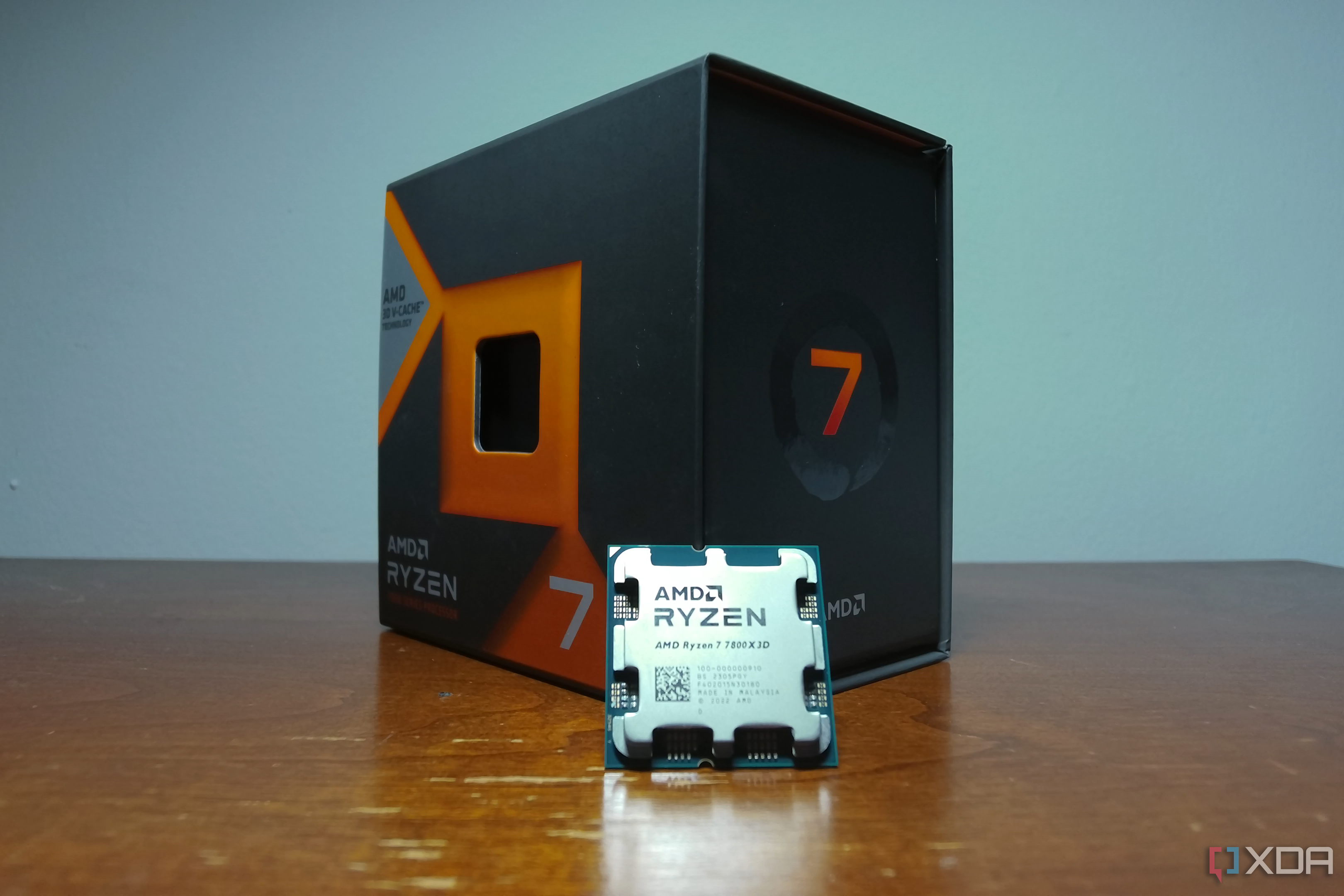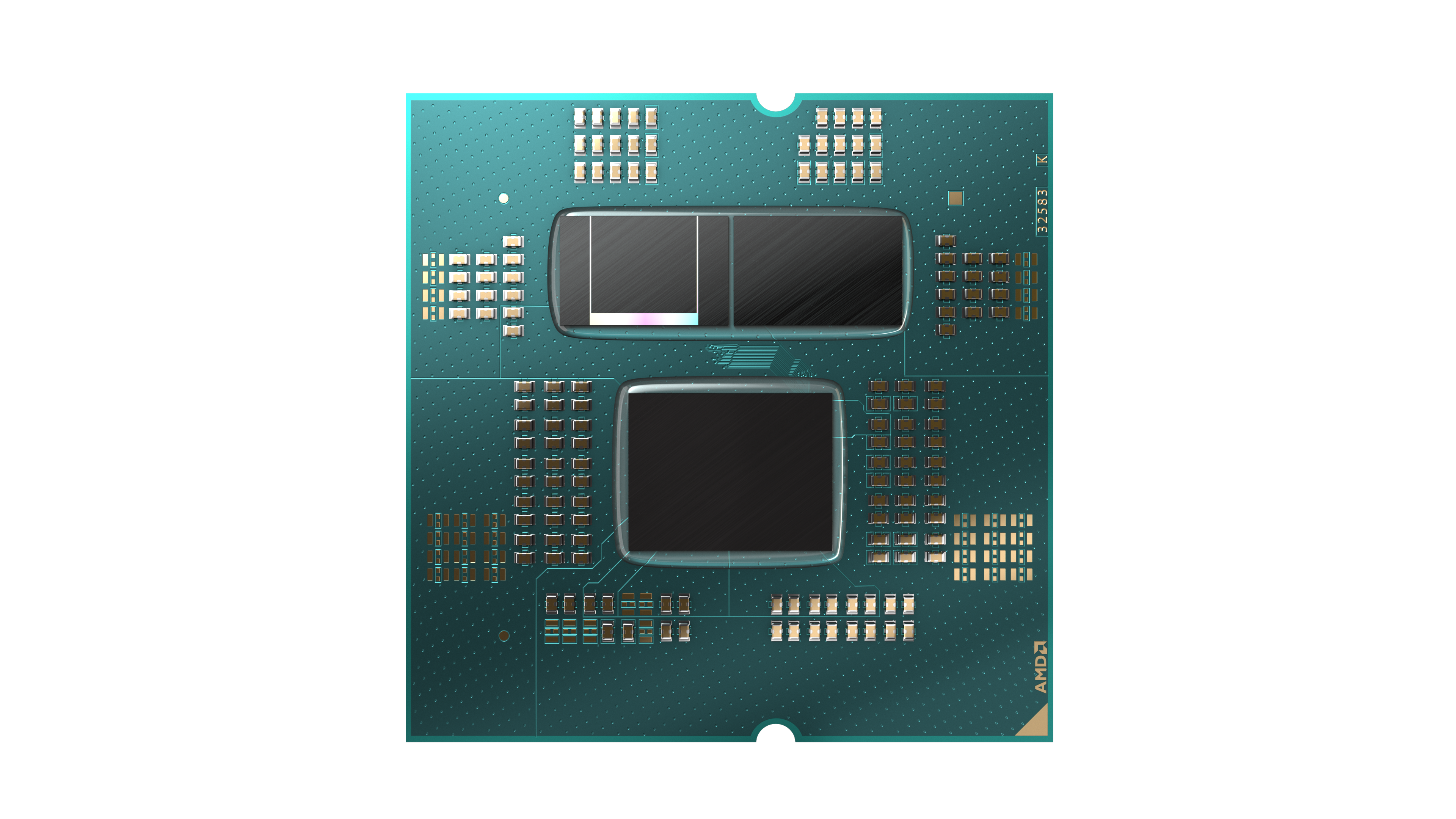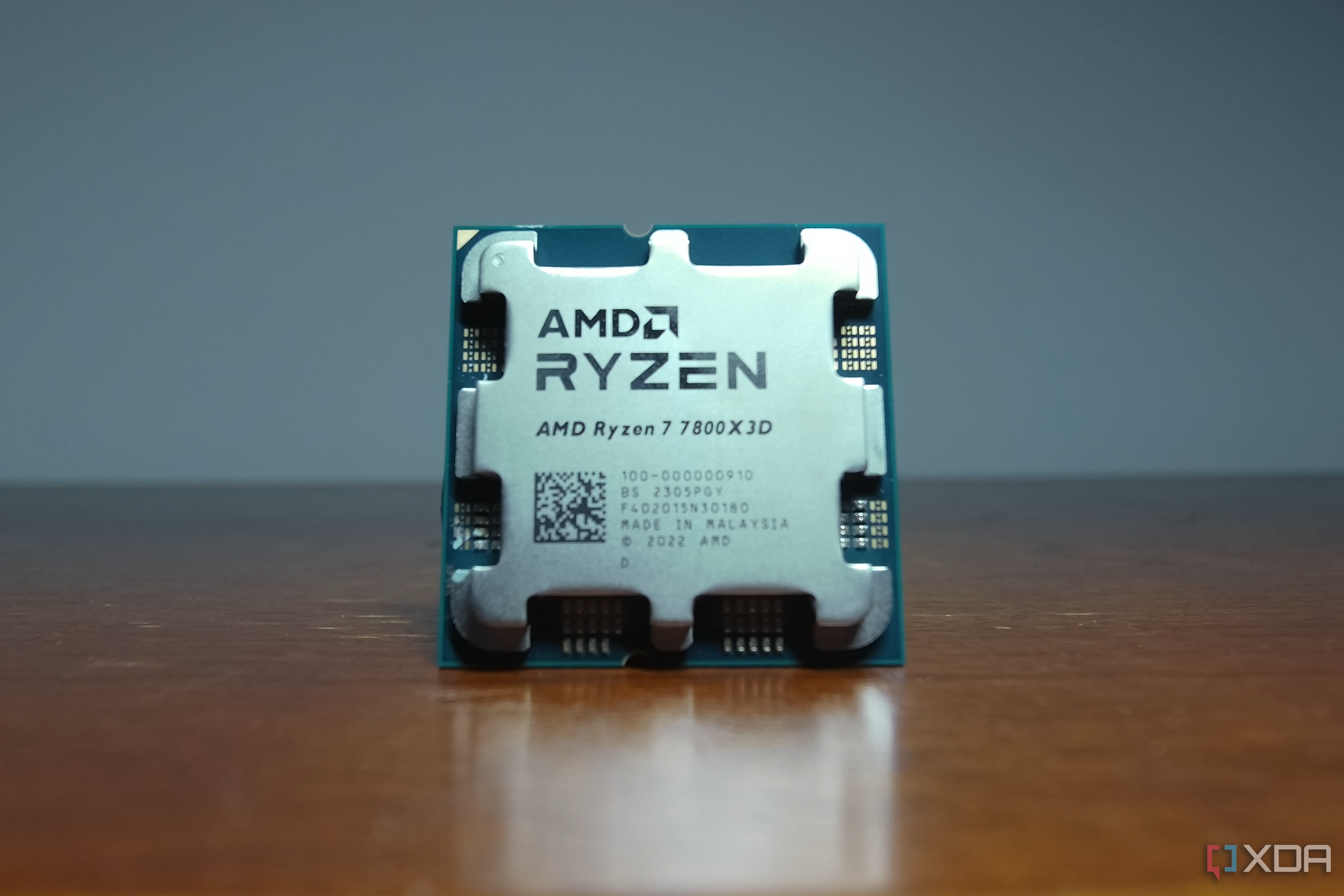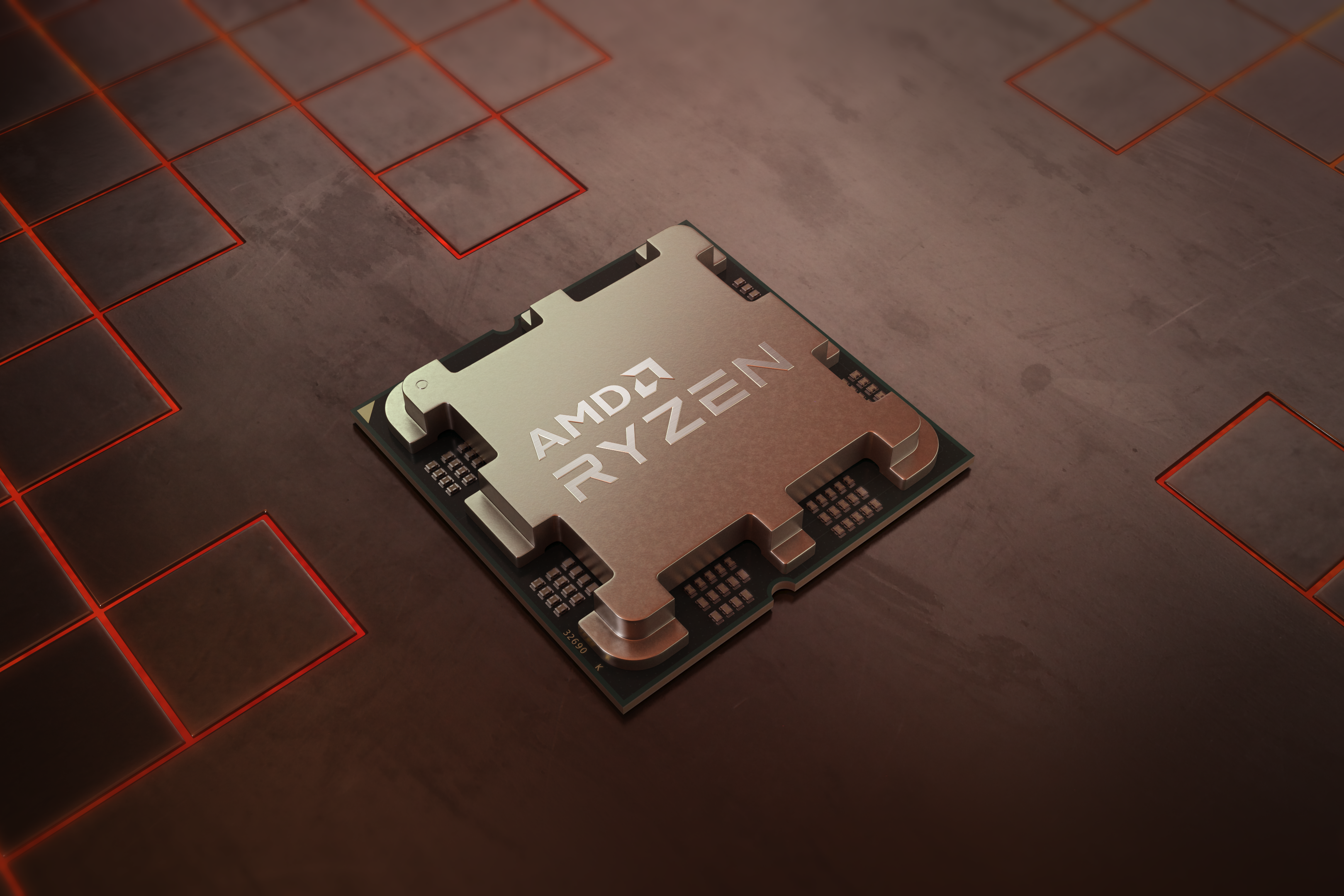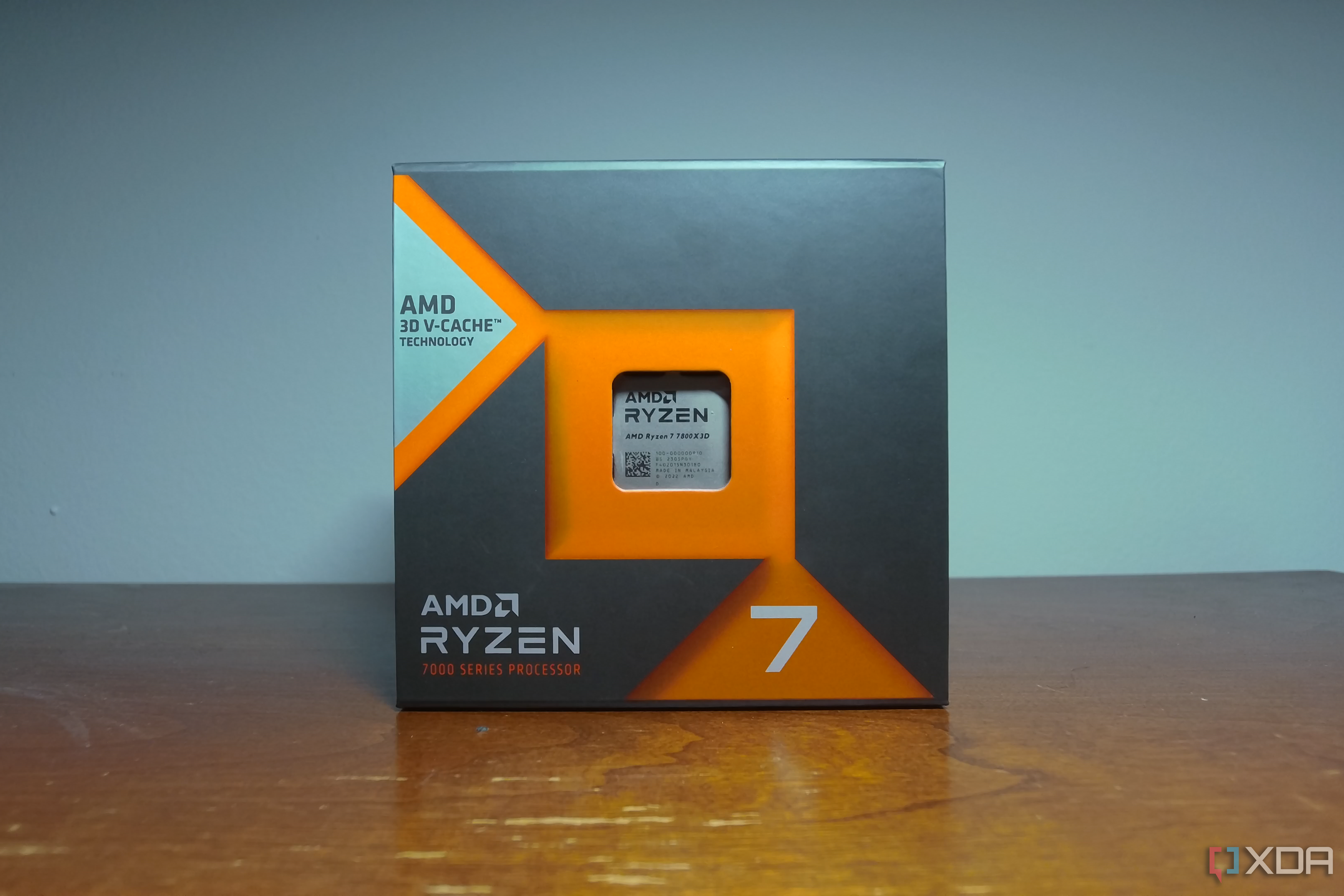Quick Links
Although the Ryzen 9 7900X3D and 7950X3D were highly anticipated since they offered 3D V-Cache on 12- and 16-core CPUs for the first time, the Ryzen 7 7800X3D will likely be the most popular model of the bunch. It retails for a much more affordable $450 and although it has fewer cores than the 7900X3D and 7950X3D, gamers are unlikely to really care about reduced multi-core performance.
Indeed, the 7800X3D is a good AMD CPU option for gamers with midrange to high-end computers. In our testing, we found that it can achieve higher framerates than AMD's other ~$400 CPU, the Ryzen 9 7900X. However, the 7800X3D isn't necessarily the best choice for every gamer even though it has theoretically higher performance. For gamers who enjoy playing at 200 FPS, it's the best gaming CPU for the money and perhaps the best gaming CPU period.
About this review: The AMD Ryzen 7 7800X3D was sent by AMD for review. AMD did not see the contents of this review prior to publication.

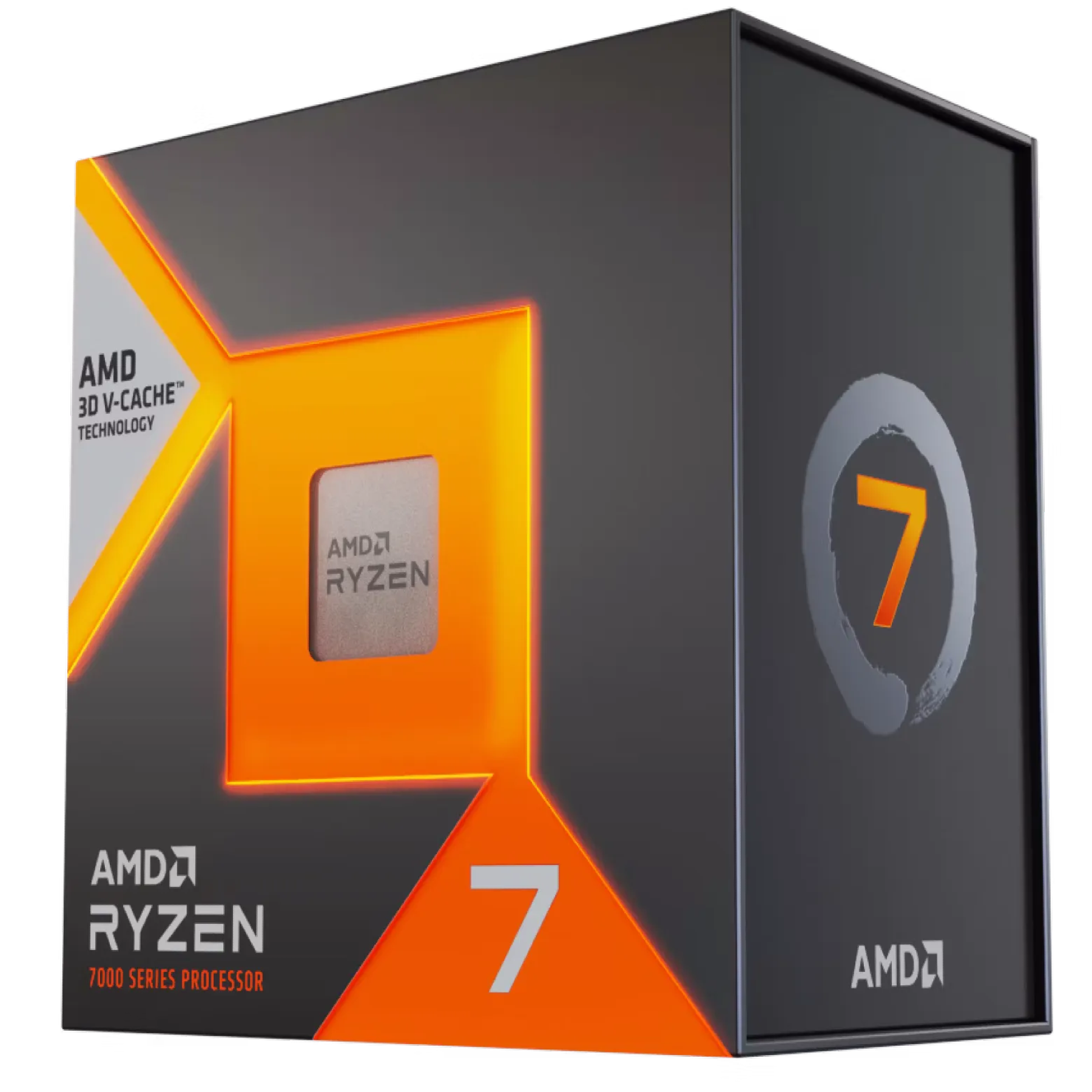
AMD Ryzen 7 7800X3D
AMD's Ryzen 7 7800X3D CPU is the company's cheapest model with 3D V-Cache and can deliver gaming performance on par or even better than that of the Ryzen 9 7950X.
- Brand
- AMD
- CPU Model
- Ryzen 7 7800X3D
- Cores
- 8
- Threads
- 16
- Architecture
- Zen 4
- Process
- 5 nm
- Socket
- AM5
- Base Clock Speed
- 4.2GHz
- Boost Clock Speed
- 5.0GHz
- Cache
- 96MB
- PCIe
- 5.0
- TDP
- 120 W
- One of the best gaming CPUs
- Cheaper than the 7950X and 13900K
- Power efficient
- Only significantly faster when gaming at 200 FPS or more
- Underwhelming single-threaded and multi-threaded performance
AMD Ryzen 7 7800X3D: Pricing and availability
- The 7800X3D has an MSRP of $450
- It's available on April 6
The 7800X3D comes out tomorrow, April 6, arriving over a month after the Ryzen 9 7950X3D and 7900X3D. It should retail for $450, though we're not sure how things will actually shake out due to supply issues (the 7950X3D is retailing for about $1,000 at the time of writing). However, AMD has had a full month to stockpile 7800X3D CPUs for launch day, and the 7800X3D should be easier to mass produce, so perhaps it'll hit that $450 price point like it's supposed to.
Zen 4 with 3D V-Cache: Architecture and features
- The 7800X3D has a far lower clock speed than other options in the 7000X3D family
- This isn't as much of a disadvantage as you'd think
Ryzen 7000 is AMD's first attempt at introducing 3D V-Cache across a large part of the product stack, as opposed to Ryzen 5000's single 3D V-Cache-equipped CPU, the Ryzen 7 5800X3D. Each 3D CPU comes with an extra chip that contains a 64MB L3 cache, which is as much L3 cache as the Ryzen 9 7900X and 7950X have. Without 3D V-Cache, the 7800X3D would only have 32MB of L3, just like the Ryzen 7 7700X.
For reference, here are all the members of the Ryzen 7000X3D family:
|
Ryzen 7 7800X3D |
Ryzen 9 7900X3D |
Ryzen 9 7950X3D |
|
|---|---|---|---|
|
Cores/Threads |
8/16 |
12/24 |
16/32 |
|
Base/Boost Clock Speed |
4.2/5.0GHz |
4.4/5.6GHz |
4.2/5.7GHz |
|
L3 Cache |
96MB |
128MB |
128MB |
|
TDP |
120 watts |
120 watts |
120 watts |
|
MSRP |
$450 |
$600 |
$700 |
One key characteristic that sets the 7800X3D apart is its far lower clock speed. At face value that might seem bad, but actually, it shouldn't be too big of a deal. There's a good reason why the 7800X3D is clocked so much lower: Each Ryzen CPU either has one or two Core Complex Dies (CCD), and a CCD has eight cores. Any Ryzen CPU with more than eight cores will have two CCDs, and a 3D V-Cache chip is installed directly on top of a CCD. Due to technical reasons, installing 3D V-Cache requires a reduced frequency.
The thing is, the 7950X3D, 7900X3D, and 7800X3D all have a single 3D V-Cache chip even though the 7950X3D and 7900X3D have two CCDs (as in the above image, V-Cache on the left, no V-Cache on the right). In theory, the 7950X3D and 7900X3D should have the best of both worlds since the CCD without V-Cache can operate at normal frequencies, whereas the 7800X3D can just barely hit 5GHz. In practice, testing data indicates that thread management is too complicated for the 7950X3D's and 7900X3D's higher frequency to actually be useful, and the 7800X3D's lower frequency might not be much of a disadvantage.
Performance: Synthetic and gaming benchmarks
How we tested
- The 7800X3D and the 7900X were tested using modern hardware
- GPU bottlenecking was mitigated by testing at lower graphics settings
The 7800X3D isn't just competing with Intel CPUs, but also the similarly priced Ryzen 9 7900X and 7900. These CPUs are slightly cheaper than the 7800X3D and provide more cores and higher clock speeds. For this test, I've pit the 7800X3D against the 7900X, which I tested in its default configuration, as well as in Eco Mode that basically turns it into a 7900. These CPUs were tested in a PC with the following hardware:
|
GPU |
Nvidia RTX 3060 Ti |
|---|---|
|
Motherboard |
Asus ROG Strix B650E-I Gaming |
|
RAM |
G.Skill Flare X5 Series 2x16GB 6000MHz CL36 |
|
Storage |
Samsung 990 Pro |
|
Cooler |
Custom liquid loop with 240mm radiator |
I put all three CPUs through 10 different benchmarks: three synthetic/productivity tests and seven games. I selected benchmarks that could highlight both the strengths and weaknesses of the 7800X3D's large amount of cache and the 7900X's higher frequency and core count. For the games (except Civilization VI), I used OCAT to record the average and 99th percentile framerates, which is what these CPUs will be judged on concerning gaming performance.
CPU benchmarking in games is notoriously complicated and at times controversial, and my methodology for this review is an attempt to offer a balanced perspective. This review asks whether the 7900(X) can hit the same framerates as the 7800X3D, which is basically the control group in these benchmarks. It's natural to assume that the 7800X3D is faster than the 7900X (AMD says as much) but the real question is how much faster.
When determining what graphics settings I would use on each benchmark (a crucial determining factor in the performance margins between CPUs), I decided I would settle on options that resulted in certain average framerates on the 7800X3D. I targeted roughly 150 FPS in four games, around 250 FPS in one game, and almost 500 FPS in another. Testing this way allows me to prevent the 3060 Ti from needlessly bottlenecking performance and also tests at the framerates gamers usually play at, which tend to be correlated to display refresh rates.
Finally, all tests used the latest software and firmware patches available. However, a mistaken update to Forza Horizon 5 slipped through while testing the 7900X with Eco Mode, which means you won't see a score for the 7900X in Eco mode for that game
Productivity and synthetic benchmarks
- The 7800X3D is slower than the 7900X, especially in multi-core workloads
- Has a lower TDP than other 7000 CPUs so consumes less heat and is more efficient
For testing single-thread, multi-thread, and general productivity and synthetic performance, I used 3DMark's Time Spy Extreme test, PCMark 10, and Cinebench R23. Time Spy Extreme's CPU test is basically a synthetic multi-core benchmark, as is Cinebench R23, which additionally tests a single core's performance. PCMark 10 is a bit more realistic as it uses real-world applications and is generally more sensitive to clock speeds rather than the raw architectural horsepower that factors into Time Spy Extreme and Cinebench R23.
|
7800X3D |
7900X |
7900X Eco Mode |
|
|---|---|---|---|
|
Time Spy Extreme CPU |
5934 |
9612 |
7723 |
|
PCMark 10 |
8257 |
9029 |
8886 |
|
Cinebench R23 Multicore |
17923 |
28488 |
22698 |
|
Cinebench R23 Single Core |
1799 |
1923 |
1956 |
The results here aren't super surprising. The 7800X3D has fewer cores and a lower clock speed than the 7900X, so it's natural that it would fall behind. The 64MB V-Cache isn't really coming into play here since cache often isn't a performance bottleneck in these kinds of workloads. For productivity and core heavy workloads, the 7900X is the better CPU; the 7900X3D and 7950X3D are also good options if you just need extra cores instead of higher frequencies.
Of course, the 7800X3D has a much lower TDP, which means less power consumption and, in turn, less heat. It peaked at 85 degrees Celsius throughout testing and under full load consumed 90W. The 7900X hit the maximum temperature of 95 degrees Celsius multiple times and consumed almost 180W under load. In Eco Mode, the 7900X consumed around 90W under load like the 7800X3D. Although the 7800X3D doesn't have great raw performance, it can't be faulted for its efficiency.
Gaming benchmarks
- The 7800X3D can be faster than the 7900X, especially when the framerate could hit 200 FPS or more
- Gamers who target around 150 FPS are unlikely to see a performance advantage with the 7800X3D
To gauge gaming performance, I tested seven games, though it could be said that Civilization VI's turn time benchmark is more similar to the productivity and synthetic benchmarks since it's very sensitive to clock speed and single-threaded performance. The other six games in this section should provide a more realistic expectation of general gaming performance, though keep in mind that your mileage will vary depending on your desired framerate.
|
7800X3D |
7900X |
7900X Eco Mode |
|
|---|---|---|---|
|
Civilization VI |
26.73s |
25.48s |
25.3s |
|
Counter-Strike: Global Offensive |
454/99 |
454/100 |
453/100 |
|
Cyberpunk 2077 |
138/95 |
140/99 |
143/105 |
|
Forza Horizon 5 |
230/164 |
214/152 |
N/A |
|
Grand Theft Auto V |
161/113 |
159/111 |
163/114 |
|
Hitman 3 |
112/98 |
111/97 |
111/97 |
|
The Witcher 3 |
135/83 |
128/87 |
128/85 |
Listed scores (except for Civilization VI) are average framerate / 99th percentile framerate
Cyberpunk 2077, Grand Theft Auto V, Hitman 3, and The Witcher 3 were the four games I benchmarked in the 150 FPS region. Here, the 7800X3D tied in every single one except The Witcher 3, where it achieved a lead of 5%. This is about what I expected since most recent CPUs can run these games pretty well at these framerates, allowing the GPU to be the bottleneck. The victory in The Witcher 3 was surprising, however; I tested in Novigrad with NPCs set to Ultra+, which could have played into the 7800X3D's strengths.
The performance in Hitman 3 is strange, however, as the GPU wasn't utilized at 100% (meaning the GPU wasn't a bottleneck) yet the performance for each CPU was the same. I didn't have enough time to look into it, but I suspect that one of the settings used for testing has something to do with it. Either way, it's pretty clear the V-Cache didn't really do anything to help and reviews for the 7900X3D and 7950X3D that tested Hitman 3 corroborate this.
The Ryzen 7 7800X3D is probably the best CPU for gamers who target at least 200 FPS.
Forza Horizon 5 and Counter-Strike: Global Offensive were the two where I targeted higher framerates, 250 and 500 FPS, respectively. When hitting higher framerates, we would ordinarily expect the faster CPU to pull ahead, and indeed this is what we see in Forza Horizon 5. Still, the result is only a 7% lead over the 7900X, which isn't exactly substantial.
Meanwhile, even though the framerate was nearly 1000 FPS at times during the Counter-Strike benchmark, all CPUs got roughly the same framerate. However, I was expecting the 7800X3D to be slower than the 7900X here per testing for previous 3D CPUs and AMD's own benchmarking, so that's actually a good result for the 7800X3D. The 7800X3D's lower frequency can cause reduced performance in games like Counter-Strike but unless you like to play at around 1000 FPS on average, you won't see worse framerates.
The main deal with the 7800X3D (and other CPUs that are good at gaming) is the fact that large margins don't appear unless you're testing at higher framerates. In AMD's reviewer's guide, the 7800X3D was 16% faster on average than the Ryzen 7 7700X, and most games were running at framerates closer to 300 FPS, with two games running at over 800 FPS. I probably should have tested an extra game or two at a high framerate so I would have my own data to demonstrate this, but other reviews will undoubtedly test at higher framerates in many games that I did not.
The 7800X3D does have one particular strength: efficiency. It consumed far less power than the 7900X in games, and since it had equal or better performance, that makes it a much more efficient CPU for gaming. It had similar or lower power consumption than the 7900X Eco Mode, which indicates that the 7800X3D might have a pretty good niche in small form factor and ITX gaming desktops, where power is limited and heat is challenging to dissipate.
Should you buy the AMD Ryzen 7 7800X3D?
You should buy the AMD Ryzen 7 7800X3D if:
- You want to game at 200 FPS or higher and avoid CPU bottlenecking
- You don't really care about single-threaded and multi-threaded performance
- You need an efficient CPU that doesn't get very hot
You shouldn't buy the AMD Ryzen 7 7800X3D if:
- You tend to game below 200 FPS
- You need good single-threaded and multi-threaded performance
The Ryzen 7 7800X3D and other 3D CPUs fulfill a good niche within the market, but they can't live up to the mythologizing I've seen lately. I even read an article that claimed the 7800X3D would be the best value CPU for gaming, which would only apply to people who crank graphics settings so low as to never be GPU bottlenecked. The 7800X3D can hit higher framerates than other Ryzen CPUs, but it certainly doesn't make them obsolete for gaming.
What I really like about the 7800X3D is that it has effectively replaced the top-end chips in AMD's lineup for gamers. Before 3D V-Cache, the fastest gaming CPUs were the most expensive options, as AMD and Intel segmented not just core counts but also frequency and cache. The 7800X3D's $450 price tag is much lower than the Ryzen 9 7950X or Core i9-13900K while likely having better gaming performance overall.
Additionally, the 7800X3D is also really efficient. In theory, it has a 120W TDP, the same as the other Ryzen 7000X3D chips, but in practice, it was running at the same power as 65W Ryzen CPUs. For users, this allows the 7800X3D to be paired with weaker coolers, like the ones you might want to use in smaller PCs.
Although the 7800X3D isn't some gaming monster and isn't revolutionizing PC gaming, it's probably the best CPU for gamers who target at least 200 FPS. If you don't find yourself trying to get the highest framerate possible in every game you play, you can probably ignore the 7800X3D and opt for the much cheaper Ryzen 7 7700X or 7700 and save about $100.

AMD Ryzen 7 7800X3D
AMD's Ryzen 7 7800X3D CPU is the company's cheapest model with 3D V-Cache and can deliver gaming performance on par or even better than that of the Ryzen 9 7950X.

